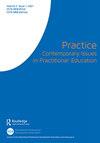Feminist Social Work: Unfinished Business
Q2 Social Sciences
引用次数: 0
Abstract
The centrality of the role of women in social work was neatly encapsulated in Hanner and Statham’s (1988) seminal text, where they concluded so much of social work was about women working with women. Hanner and Statham and then White (2006) in her equally seminal text identified that the commonalities that women as social workers and clients share, are by necessity shaped through economic, organisational, political and social contexts. While change has taken place during the intervening years, the need to continue to understand practice and professional perspectives through the feminist lens remains. Such experiences of women as social workers, mothers, carers, and victims, are the foci of this issue, which collates examples taken from around the world. We begin with Meenu Anand’s feminist exploration of an Indigenous Model of Practice in India. She begins by acknowledging that social work is largely construed as a feminised occupation. From this starting point she develops a theoretical article that intersects the commonalities of feminism and social work. These basis are used to then formulate a rich contextualised practice framework which in turn is amplified into developing an Indian model for feminist social work. The article then concludes with three illustrative case study vignettes and by drawing out some implications for practice. Anand’s concluding message is that by embracing the existing struggle for gender equality and justice, feminism continues to play a dynamic and central role in contemporary social work. The explicit discussion of the value of feminism to social work is maintained in our second theoretical article by Vasintha Veeran, Susan Flynn and LeighAnn Sweeney, who explore feminist egalitarian discourse in social work education within an Irish context. They begin by usefully outlining for the reader the specifics of the Irish social work and education perspective. The article then moves on to explore the apparent resistance to engaging with feminist女权主义社会工作:未竟事业
汉纳(Hanner)和斯坦森(stantham)在1988年的开创性著作中巧妙地概括了女性在社会工作中的中心地位,他们在书中总结说,很多社会工作都是关于女性与女性一起工作的。汉纳、斯坦森和怀特(2006)在她同样具有开创性的文章中指出,女性作为社会工作者和客户所拥有的共性,必然是由经济、组织、政治和社会背景塑造的。虽然在此期间发生了变化,但仍然需要继续通过女权主义的视角来理解实践和专业观点。这些妇女作为社会工作者、母亲、照顾者和受害者的经历是这个问题的焦点,它整理了来自世界各地的例子。我们从Meenu Anand对印度本土实践模式的女权主义探索开始。她首先承认,社会工作在很大程度上被认为是一种女性化的职业。从这个出发点出发,她发展了一篇理论文章,将女权主义和社会工作的共性交叉起来。这些基础被用来制定一个丰富的情境化实践框架,这反过来又被放大为发展女权主义社会工作的印度模式。文章最后用三个说明性的案例进行了总结,并对实践提出了一些启示。阿南德的结论是,通过拥抱现有的争取性别平等和正义的斗争,女权主义继续在当代社会工作中发挥着充满活力和核心的作用。关于女权主义对社会工作的价值的明确讨论在我们的第二篇理论文章中得到了维护,作者是Vasintha Veeran、Susan Flynn和LeighAnn Sweeney,他们在爱尔兰的背景下探讨了社会工作教育中的女权主义平等主义话语。他们首先为读者概述了爱尔兰社会工作和教育视角的具体情况。文章接着探讨了与女权主义者接触的明显阻力
本文章由计算机程序翻译,如有差异,请以英文原文为准。
求助全文
约1分钟内获得全文
求助全文

 求助内容:
求助内容: 应助结果提醒方式:
应助结果提醒方式:


